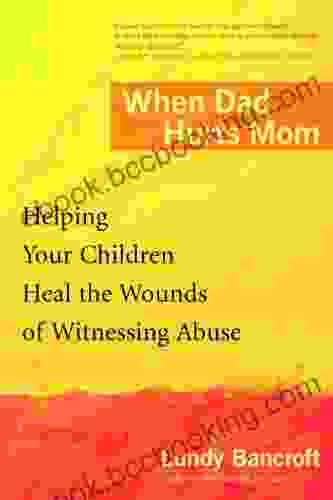Helping Your Children Heal The Wounds Of Witnessing Abuse: A Comprehensive Guide for Parents

4.7 out of 5
| Language | : | English |
| File size | : | 684 KB |
| Text-to-Speech | : | Enabled |
| Screen Reader | : | Supported |
| Enhanced typesetting | : | Enabled |
| Word Wise | : | Enabled |
| Print length | : | 388 pages |
Table of Contents
- Understanding the Impact of Witnessing Abuse
- Signs and Symptoms of Trauma in Children
- Creating a Safe and Supportive Environment
- Talking to Your Children About Abuse
- Seeking Professional Help
- Taking Care of Yourself
- Resources and Support for Parents
Understanding the Impact of Witnessing Abuse
Witnessing abuse can have a profound and lasting impact on children's physical, emotional, and mental health. Even if they were not directly harmed, witnessing violence can create a sense of fear, insecurity, and confusion.
Children who witness abuse may experience:
- Anxiety, depression, and other mental health issues
- Difficulty concentrating and learning
- Behavioral problems, such as aggression or withdrawal
- Physical symptoms, such as headaches or stomachaches
The impact of witnessing abuse can vary depending on the child's age, gender, personality, and other factors. However, it is important to be aware of the potential risks and to seek help if your child is showing signs of trauma.
Signs and Symptoms of Trauma in Children
The signs and symptoms of trauma in children can vary depending on the individual child, but some common indicators include:
- Behavioral changes: Aggressive or withdrawn behavior, changes in sleep or eating habits, regressive behaviors (such as thumb-sucking or bedwetting)
- Emotional changes: Anxiety, depression, anger, irritability, difficulty concentrating or learning
- Physical symptoms: Headaches, stomachaches, fatigue, difficulty sleeping
- Cognitive changes: Difficulty understanding or processing information, difficulty making decisions or remembering things
- Social changes: Difficulty interacting with peers or adults, withdrawal from activities, avoiding social situations
If you are concerned that your child may have witnessed abuse, it is important to take action promptly. Talk to your child about what they saw or heard, and provide them with support and reassurance.
Creating a Safe and Supportive Environment
Creating a safe and supportive environment is crucial for helping your children heal from the trauma of witnessing abuse.
- Believe your child: Assure your child that you believe them and that it is not their fault that they witnessed abuse.
- Provide a safe space: Let your child know that they can come to you at any time to talk about what they are going through.
- Be patient and understanding: Healing from trauma takes time, and there will be setbacks along the way. Be patient and understanding with your child, and let them know that you are there for them every step of the way.
- Encourage self-expression: Allow your child to express their feelings through talking, drawing, writing, or other creative activities.
- Respect their boundaries: Let your child know that they have the right to say no to anything that makes them uncomfortable.
- Set limits and boundaries: Establish clear rules and expectations for your child's behavior, and be consistent with your discipline.
- Encourage positive relationships: Help your child build healthy relationships with other adults and children.
Creating a safe and supportive environment can help your child feel secure and loved, which is essential for their healing process.
Talking to Your Children About Abuse
Talking to your children about abuse can be a challenging task, but it is important to do it in a sensitive and supportive way.
- Choose the right time and place: Pick a time and place where you and your child can talk privately and without interruption.
- Start by listening: Let your child tell their story in their own way. Avoid interrupting or trying to steer the conversation in a certain direction.
- Be honest and age-appropriate: Use language that your child can understand, and be honest about the facts of what happened.
- Reassure your child: Let your child know that they are not alone, and that you are there to help them. Assure them that it is not their fault that they witnessed abuse.
- Answer your child's questions: Be prepared to answer your child's questions about abuse in a simple and truthful way.
- Be patient: It may take time for your child to process what happened and to come to terms with their feelings.
Talking to your children about abuse can be difficult, but it is an important step in helping them to heal and move forward with their lives.
Seeking Professional Help
If you are concerned about your child's behavior or well-being, it is important to seek professional help.
- Therapists: Therapists can help children process the trauma of witnessing abuse and develop coping mechanisms.
- Counselors: Counselors can provide support and guidance to both children and parents.
- Support groups: Support groups can provide a safe and supportive environment for children and parents to share their experiences and learn from others.
Professional help can make a significant difference in your child's recovery. Don't hesitate to reach out for help if you feel overwhelmed or unsure of how to help your child.
Taking Care of Yourself
Taking care of your own physical and emotional health is essential when helping your children heal from the trauma of witnessing abuse.
- Get enough sleep: Sleep is essential for both physical and mental health. When you are well-rested, you will be better able to cope with the stress of supporting your child.
- Eat healthy foods: Eating a healthy diet will give you the energy you need to care for yourself and your child.
- Exercise regularly: Exercise is a great way to relieve stress and improve your mood.
- Connect with others: Talk to friends, family, or other parents who can offer support and encouragement.
- Seek professional help if needed: If you are struggling to cope with the stress of supporting your child, don't hesitate to seek professional help.
Taking care of yourself will not only help you to be a better parent, but it will also model healthy coping mechanisms for your child.
Resources and Support for Parents
There are many resources available to help parents support their children who have witnessed abuse.
- Childhelp USA: 1-800-422-4453
4.7 out of 5
| Language | : | English |
| File size | : | 684 KB |
| Text-to-Speech | : | Enabled |
| Screen Reader | : | Supported |
| Enhanced typesetting | : | Enabled |
| Word Wise | : | Enabled |
| Print length | : | 388 pages |
Do you want to contribute by writing guest posts on this blog?
Please contact us and send us a resume of previous articles that you have written.
 Book
Book Novel
Novel Page
Page Chapter
Chapter Text
Text Story
Story Genre
Genre Reader
Reader Library
Library Paperback
Paperback E-book
E-book Magazine
Magazine Newspaper
Newspaper Paragraph
Paragraph Sentence
Sentence Bookmark
Bookmark Shelf
Shelf Glossary
Glossary Bibliography
Bibliography Foreword
Foreword Preface
Preface Synopsis
Synopsis Annotation
Annotation Footnote
Footnote Manuscript
Manuscript Scroll
Scroll Codex
Codex Tome
Tome Bestseller
Bestseller Classics
Classics Library card
Library card Narrative
Narrative Biography
Biography Autobiography
Autobiography Memoir
Memoir Reference
Reference Encyclopedia
Encyclopedia Nancy Isenberg
Nancy Isenberg Melissa Haag
Melissa Haag Terri Sabol
Terri Sabol Vincent Giroud
Vincent Giroud Marianne Waggoner Day
Marianne Waggoner Day Stephan Martin
Stephan Martin Reginald Dipwipple
Reginald Dipwipple Mike Litzow
Mike Litzow Nick Hunt
Nick Hunt Michelle Segrest
Michelle Segrest Tanya Lee Stone
Tanya Lee Stone Noel Johnson
Noel Johnson Luke Rosiak
Luke Rosiak Matt Bronsil
Matt Bronsil Prof Sham Tickoo Purdue Univ
Prof Sham Tickoo Purdue Univ Lily Oliver
Lily Oliver Kim Zubek
Kim Zubek Olugbemisola Rhuday Perkovich
Olugbemisola Rhuday Perkovich Peter Korn
Peter Korn Lawrence F Locke
Lawrence F Locke
Light bulbAdvertise smarter! Our strategic ad space ensures maximum exposure. Reserve your spot today!

 Carlos DrummondHappy Birthday Bad Kitty: A Purr-fect Tale for Young Readers and Cat Lovers...
Carlos DrummondHappy Birthday Bad Kitty: A Purr-fect Tale for Young Readers and Cat Lovers...
 Heath PowellDiscover Castles Discover Reading: Unlock the Enchanting Secrets of History's...
Heath PowellDiscover Castles Discover Reading: Unlock the Enchanting Secrets of History's...
 Natsume SōsekiUnleash Your Culinary Prowess with "Foil Packet Grilling, Campfire Cooking,...
Natsume SōsekiUnleash Your Culinary Prowess with "Foil Packet Grilling, Campfire Cooking,... Ray BlairFollow ·12.8k
Ray BlairFollow ·12.8k Gordon CoxFollow ·8.7k
Gordon CoxFollow ·8.7k Gustavo CoxFollow ·18k
Gustavo CoxFollow ·18k Ralph EllisonFollow ·17.1k
Ralph EllisonFollow ·17.1k Brett SimmonsFollow ·6.6k
Brett SimmonsFollow ·6.6k Dennis HayesFollow ·13.6k
Dennis HayesFollow ·13.6k Tyrone PowellFollow ·5k
Tyrone PowellFollow ·5k Danny SimmonsFollow ·8.8k
Danny SimmonsFollow ·8.8k

 Philip Bell
Philip BellPersonal History: From the Last Imperial Dynasty to the...
By Author Name A...

 Gustavo Cox
Gustavo CoxAlexander Csoma de Kőrös: The Father of Tibetology
Alexander...

 Harvey Bell
Harvey BellUnveiling the Titanicat: Dive into the True Stories...
A Literary Voyage into the...

 José Martí
José MartíUnveiling the Festive Flavors of Christmas: A Culinary...
As the crisp winter air fills with the...
4.7 out of 5
| Language | : | English |
| File size | : | 684 KB |
| Text-to-Speech | : | Enabled |
| Screen Reader | : | Supported |
| Enhanced typesetting | : | Enabled |
| Word Wise | : | Enabled |
| Print length | : | 388 pages |










